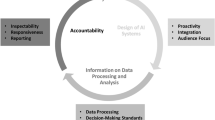Abstract
This paper is a revised and extended version of a keynote contribution to a recent conference on Cognitive Informatics. It offers a brief summary of some of the core concerns of other contributions to the conference, highlighting the range of issues under discussion; and argues that many of the central concepts and preoccupations of cognitive informatics as understood by participants--and others in the general field of computation--rely on ill-founded realist assumptions, and what has been termed the functionalist view of representation. Even if such ideas--albeit in a revised form -- can be defended, there must be a more extensive engagement with the literature and issues outside the confines of the computing and computational orthodoxy.
Similar content being viewed by others
References
Anderson, J., 2002: Hybrid computation with an attractor neural network, in Y. Wang, R. Johnson and M. Smith (eds.), Proc.First IEEE International Conference on Cognitive Informatics, IEEE, Los Alamitos, CA, pp. 3-12.
Azuma, M., 2002: Software metrics and human factors for WIBIS, in Y. Wang, R. Johnson and M. Smith (eds.), Proc.First IEEE International Conference on Cognitive Informatics, IEEE, Los Alamitos, CA, pp. 77-83.
Berger, P. and Luckman, T., 1968: The Social Construction of Reality, Penguin, Harmondsworth, United Kingdom.
Berman, B., 1989: The computer metaphor: Bureaucratizing the mind, Sci.Cult. 7.
Brooks, R. A., 1999: Cambrian Intelligence, MIT Press, Cambridge, MA.
Chiew, V., 2002: A software engineering cognitive knowledge discovery framework, in Y. Wang, R. Johnson and M. Smith (eds.), Proc.First IEEE International Conference on Cognitive Informatics, IEEE, Los Alamitos, CA, pp. 163-172.
Cilliers, P., 1998: Complexity and Postmodernism, Routledge, London.
Davis, A., 1998: The Harmony in Rechoirments (Editorial) IEEE Software, March/April.
Dawson, M., 2002: From embodied cognitive science to synthetic psychology, in Y. Wang, R. Johnson and M. Smith (eds.), Proc.First IEEE International Conference on Cognitive Informatics, IEEE, Los Alamitos, CA, pp. 13-22.
Douglas, M., 1987: How Institutions Think, Routledge, London.
Dreyfus, H. L. and Dreyfus, S. E., 2000: Mind Over Machine, Free Press, Glencoe, UK.
Far, B., 2002: Software agents: Quality, complexity and uncertainty issues, in Y. Wang, R. Johnson, and M. Smith, (eds.), Proc.First IEEE International Conference on Cognitive Informatics, IEEE, Los Alamitos, CA, pp. 122-131.
Giddens, A., 1986: The Constitution of Society, Polity, Cambridge, United Kingdom.
Haraway, D., 1985: A manifesto for Cyborgs, Soc.Rev. 80, 65-108.
Hayles, N. K., 1999: How We Became Posthuman, University of Chicago Press, Chicago.
Johnston R., Wang, Y. and Smith, M., 2002: Preface, in Y. Wang, R. Johnson and M. Smith (eds.), Proc.First IEEE International Conference on Cognitive Informatics, IEEE, Los Alamitos, CA, p. ix.
Liebenau, J. and Backhouse, J., 1990: Understanding Information, Macmillan, Houndmills, United Kingdom.
Lindsay, P. and Norman, D. A., 1971: Human Information Processing; an Introduction to Psychology, Academic Press, London.
Patel, S., 2002: Understanding problems and problem situations-A systems approach, in Y. Wang, R. Johnson and M. Smith (eds.), Proc.First IEEE International Conference on Cognitive Informatics, IEEE, Los Alamitos, CA, pp. 84-87.
Pfeifer, R. and Scheier, C., 1999 Understanding Intelligence, MIT Press, Cambridge, MA.
Reddy,M. J., 1993: The conduit metaphor: A case of frame conflict in our language about language, in A. Ortony, (ed.), Metaphor and Thought, 2nd edn., Cambridge University Press, United Kingdom.
Simon, H. A., 1996: Sciences of the Artificial, MIT Press, Cambridge, MA.
Sugawara, K., 2002: An agent-based framework for developing flexible distributed systems, in Y. Wang, R. Johnson and M. Smith (eds.), Proc.First IEEE International Conference on Cognitive Informatics, IEEE, Los Alamitos, CA, pp. 101-106.
Sveiby, K.-E., What is information?, Oct 1994, updated 31 Dec 1998; available at http://www. sveiby.com/articles/Information.html [accessed 22/01/2003]
Wang, Y., 2002; On cognitive informatics, in Y.Wang, R. Johnson and M. Smith (eds.), Proc.First IEEE International Conference on Cognitive Informatics, IEEE, Los Alamitos, CA, pp. 34-42.
Wang, Y., Johnson, R. and Smith, M. (eds.), 2002: in Proc.First IEEE International Conference on Cognitive Informatics, IEEE, Los Alamitos, CA.
Winograd, T. and Flores, F., 1986: Understanding Computers and Cognition, Addison-Wesley, London.
Author information
Authors and Affiliations
Rights and permissions
About this article
Cite this article
Bryant, A. Cognitive Informatics, Distributed Representation and Embodiment. Brain and Mind 4, 215–228 (2003). https://doi.org/10.1023/A:1025409729387
Issue Date:
DOI: https://doi.org/10.1023/A:1025409729387




